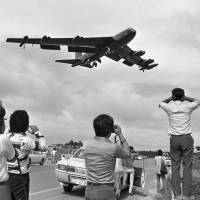Japan gave tacit approval to a U.S. decision in 1969 to withhold from local residents the fact that the U.S. military sent B-52 bombers on missions during the Vietnam War from a base in Okinawa Prefecture, declassified Japanese diplomatic records showed Thursday.
At the time, fears were growing that local opposition to the bombers' deployment in Okinawa would escalate. The island chain was a key staging point and supply base for the U.S. military during the Vietnam War.
One of the B-52s crashed at Kadena Air Base in November 1968, prompting residents to call for the withdrawal of the bombers and threaten a general strike on Feb. 4, 1969. Okinawa, which still hosts the bulk of U.S. military bases in Japan, was under U.S. occupation until its delayed reversion in 1972.
On Feb. 19, 1969, Richard Finn, then director of the Office of Japanese Affairs at the State Department, said Washington did not intend to publicize concrete actions taken by U.S. military aircraft and ships, according to a top secret cable sent from Japanese Ambassador to the United States Takeso Shimoda to Foreign Minister Kiichi Aichi.
Finn expressed his view that it would be reasonable not to publicize the dispatch of B-52s to Vietnam amid residential opposition to the stationing of the aircraft, and the Japanese side did not voice objection, according to the cable.




